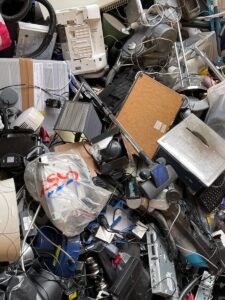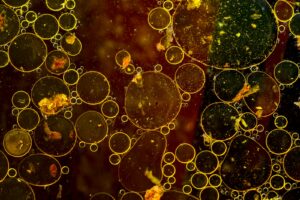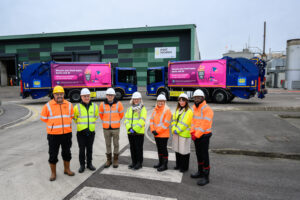Interview: Lucy Siegle on the plastic pandemic
Journalist, broadcaster and eco-expert Lucy Siegle has had a weekly slot on BBC 1’s The One Show dedicated to battling waste plastic and a decade of experience as the Observer and Guardian’s Ethical Living columnist. Her latest book, Turning the Tide on Plastic, is a primer into the plastic problem and gives useful tools on how we can make meaningful changes in our everyday lives.
She spoke on the phone to Environment Journal about the sea change in public opinion regarding plastic waste, the reasons we all have ‘plastic on our hands’, and why she will always remain an optimist.
How important was the Blue Planet II series in raising awareness of the plastic problem?
The Blue Planet effect is real. I work on a very mainstream show, The One Show, and we definitely got a mandate on that because the public felt so strongly about it. We have a large, wide-ranging audience across the country and I haven’t met anyone that doesn’t care. I feel like a starting pistol has been fired and we all fit into the plastic pandemic somewhere.
Lots of retailers and companies are now making plastic pledges, how serious are they about making real change?
In the book, I talk about how I’ve been following plastic for over 10 years. In 2005, I felt like I was at war with some retailers for shrink wrapping coconuts. I talk about my complacency in that I didn’t feel like I followed through with it at the time.
I was mollified by retailer promises and things like the Packaging Recovery Note (PRN) system. I shouldn’t have trusted them and I shouldn’t have taken my eye off the ball.
So when Blue Planet happened I felt, this is it – you have to be much more energetic and much pushy and call people to account a lot more. I knew what my job was. I was meeting a lot of people who wanted to know what their jobs should be and that’s why I wrote the book.
We’ve seen some shifts in tone and a removal of some of the mythologies around plastic that placated us last time around.
The retailers always used to come back to the idea that packaging increases the longevity of food products, so, therefore, it would be wasteful if they’re not there.
Overpackaging is actually illegal but there’s a loophole where they say the consumer demands it. But now, the consumer is very clearly not demanding it and it’s a very different response. If you take those industry get out of jail free cards away, then things look a lot more interesting. Will everyone make good on their plastic pledges? No. But part of our job is holding their feet to the fire.
A National Audit Office (NAO) report published last week said recycling figures are open to ‘fraud and error’. Has the Government put enough pressure on the recycling industry to put this right?
I was really paranoid that I was being too hard on the recycling industry but the NAO has said everything that I’ve been saying.
My book is a really clear-sighted analysis of recycling and I saw how the industry had watered down plastic recycling targets over the past five years. I spoke to a lot of people in the industry.
From the very outset, I was really clear that for all those people who want to recycle, they need really clear strategies. It’s currently not fit for purpose. Is the Government doing enough? No, because recycling is their front line and they’ve absolutely let us down. It’s an absolute scandal. People are being set up to fail and that’s really irritating.
There’s also a lot of confusion. After I laid it all bare, I came up with strategies so people can take back control, which is really important. Policymakers haven’t engaged with the issue at all. Retailers have been allowed to prioritise everything else and have shunted recycling down their list of priorities. They’ve completely hoodwinked all of us about plastic packaging.
Retailers argue that we have a plastic packaging recovery system but this doesn’t work properly. The system is vulnerable.
It’s not like everyone is so invested in PRN. It’s not like leaving Europe, we should be able to come up with something better!
I’m pretty confident we can reconfigure it better than we do it now.
What’s been holding the industry back from changing the current systems?
Complacency and inertia. We’re a supermarket culture in the UK so historically our food has been heavily wrapped. We have a psychological attachment to packaging.
We have a strange idea of what innovation is. We apply innovation to our standard prejudices but what we really need to do is look at the whole picture, including behavioural change, and really question the way we buy and sell food.
Is the younger generation more conscientious when it comes to waste?
It’s a real mix. I see people in their fifties and sixties who have grandchildren. They’re taking them to the beach or river and because plastic is a very visceral problem in water, the grandchildren will get upset and know that whales or penguins will eat it. That generation gets really angry. The older demographic is very affected by the plastic pandemic, and have a connection with a less wasteful society. The parents of baby boomers were brought up in a make-do-and-mend culture.
People have gravitated back to using glass milk bottles really quickly. Then you’ve got Millennials and Generation Z’ers who have never known a milkman. They haven’t grown up in that culture, so they treat it like an innovation.
According to a 2015 report, five Asian countries – China, Indonesia, the Philippines and Vietnam and Thailand – accounted for up to 60% of the plastic waste leaking into the ocean. How can we help these countries to reduce these numbers?
I don’t think its incumbent on us to change attitudes in other countries. I’m worried about this colonial, ‘its all their problem’ attitude.
When I went to Sri Lanka, we looked at the rubbish piles around Galle and the water system there, it was catastrophically awful.
Industrial nations like ours export our plastic problem. Who can say hand on heart and say they’ve phoned up their council and said where are you sending your waste to?
Nobody takes that level of action. We sit and say ‘that’s not our problem, it’s someone else’s problem’. Not only do we export our plastic, we export production.
13% of our carbon emission footprint in the UK is not accounted for and is offshored to developing nations who make stuff for us. That all has a plastic penalty.
We’re also invested as shareholders in companies who might have a very ‘woke’ profile in our own nation, and will be sponsoring all sorts of beach cleans, but they are actively targeting developing nations because they need to sell plastic.
It’s a global pandemic and you can’t shift blame on any country. We know from the way plastic moves around ocean currents, and the way we offset production, that we are culpable in so many ways.
Let’s face it. We’ve all got plastic on our hands!
Are you hopeful for the future?
I’m an optimist! We look at the numbers and they’re alarming, but now millions of people are saying we are not going to let this issue rest, and that’s a cause for optimism.
Plastic-free communities are really taking off in the UK and all sorts of people are coming together to meet and talk about plastic.
It’s a bit like in Holland where you have local councils who talk about water. They get together like parish councils to meet only about water. We’re now seeing the same evolution here but with plastic. This didn’t exist last year.
With social media, people are more inclined to get together and start to look at things themselves, and then force it onto the agenda. The NHS, the BBC and Buckingham Palace are all talking about how much plastic they use. It’s extraordinary.
People are spending £470 a year on packaging they don’t want. If we are shouldering 90% of the cost of collection and disposal through taxes, that’s an awful lot of money that could go to healthcare or education. Local authorities are really struggling.
A lot of people get really annoyed because of collection days or other things [related to recycling]. They see all of the stick and none of the carrot. Wales is number two in the world for recycling. I saw Conwy’s beautiful recycling centre gleaming in the sunlight. They’re able to access the world market, and yes China will still take it.
This in the long term means your council will have a sustainable waste budget. It may be fanciful that council tax will come down, but the carrot will be more money can be diverted to services that we all agree we’d like more budget to go to, rather than on bins!

Turning The Tide On Plastic, is available to buy now.















